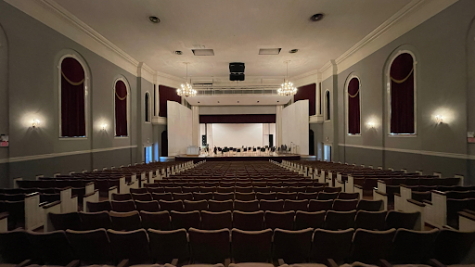How will the federal infrastructure plan affect college students?
Fifty years ago in the 1970s, the United States witnessed its last major infrastructure project that added to and revised the layout of the nation. For the past half-century, our nation has been relying on the structure that was built before the internet. An exponentially growing, privately paid for, and often unreliable network that supports a multitude of jobs, cities and even national economies is accompanied by infrastructure that predates it by almost a decade. President Biden and congressional Democrats are hard at work promoting the American Jobs Plan, an infrastructure plan that will modernize, revise and replace various elements of the current standing infrastructure. It will be done through two bills: a bipartisan legislative spending bill that has passed the Senate and a budget reconciliation bill that is currently being drafted.
According to Ken Gilmore, professor of political science at Guilford College, “the bipartisan bill will pay for improvements in ‘hard’ infrastructure (roads, bridges, broadband).” Certain elements will be completely rebuilt while others will be repaired to acceptable standards. As a result, students may find the new implements as vast improvements upon the standard quality of life and safety conditions for those relying on these utilities.
Under the infrastructure plan, the nation’s roads will not only be repaired but also bustle with a variety of new vehicles. Public transportation is a major aspect of the infrastructure revival (infrastructure bill?), with funds aimed at bringing (creating) more efficient bus transportation as well as train transportation. A rail network will be established to connect far regions of the continental United States.
Students who live off-campus may find that a more reliable public transportation system can save them money on personal expenses such as fuel and car maintenance. Students also may not need to rely on vehicles to get around town anymore, as public transportation can assist short (bus) and long-distance (train) travel. Those who are studying away from home can find a reliable train system to move to and from home when traveling. Overall, transportation will become more efficient and cheaper for the public to use across the nation.
People who live in areas with unreliable power may find a different situation in the upcoming months after the bill with spending towards patching undependable utilities. Power grids such as the one that fell to the Texas winter freeze and left many without power for days will soon seem obsolete. The changes to the nation’s power infrastructure will not only fix reliability issues but also address climate change. With the threat of climate change pushing natural disasters closer to us, clean energy sources for large power grids will be implemented to combat the generation of power from fossil fuels.
The clean energy transition also will take place in the automotive industry with the subsidization of (subsidies for) electric vehicles as well as alternative fuel research. Clean cars also will be cheaper cars, accompanied by a network of charging stations. With so many young people fighting for climate protection, these vehicles soon will offer a way to take direct action in preventing further climate change. Stricter enforcement of environmental protection laws also will help combat excessive pollution.
The infrastructure plan not only promotes more reliable versions of current systems but the establishment of newer systems. For example, municipal broadband is possible in the near future for many students whose education or careers rely on technology. Publicly accessible internet access with reliable network strength would cut down on the hundreds of dollars many people spend on reliable internet service.
If the infrastructure plan passes Congress and arrives at the president’s desk, the federal government will initiate mass employment to bring the policies and projects to fruition. As Gilmore stated, “the construction jobs would be a blessing for many families and communities.” Construction and revival of the nation’s roadways, construction of a new rail system, and the implementation of municipal broadband will enlist manual labor that will, reportedly, be paid fair wages. Other jobs will emerge through the management and maintenance of such projects, creating open employment opportunities throughout the country.
The job benefits do not only come from within these upcoming employment opportunities. The increased wages for employees under this project and the allowance of unionization under the federal government’s infrastructure projects will incentivize other employers to create competitive conditions and benefits to secure their employees. The private sector may need to increase wages for their employees as well as allow unionization (or merely roll back restrictions on employees) to prevent workers from leaving. Overall, it is possible for new competition to spark a change in the current state of economics.
Alongside the changes in infrastructure and employment, family benefits are going to be expanded through this plan, even more than the benefits given through the American Rescue Plan (the COVID-19 Relief Bill). Gilmore lists policies that are included in the bill: “expanding Medicare, child tax credits, family and medical leave.” Students who need aid in taking care of their families will find aid, as elderly citizens will be given more care and welfare through the expansion of Medicare. On the other hand, parents receive the child tax credits and family leave.
There is still more than job, infrastructure, and family benefits that stem from the American Jobs Plan. The infrastructure bill will implement another avenue for college students to earn an education with drastically lower expenses, as President Biden hopes to initiate a free community college system. Students can earn two years’ worth of credits or an associate degree with minimal expenses before moving on to higher education.
President Biden and congressional Democrats are seeking to implement several important policies in the upcoming infrastructure plan that will preserve one key virtue for the American people: choice. People have a choice on whether to use a public or private utility and public transportation or privately owned vehicles. There is a choice on which education route to follow that best suits an individual’s financial status. More reasonable wages allow people to handle finances more comfortably and even save money to choose a more preferable path in life. The freedom of Americans to choose what to integrate into their lives will be preserved and expanded upon with these bills.







